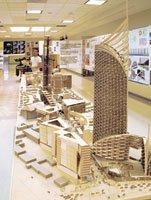Reduce Reuse Repurpose
Greener Vegas expands beyond recycling to finding new uses for discarded trade show materials.
Founded in 2007, Greener Vegas is a nonprofit organization that helps companies in their recycling efforts. Based in Las Vegas, the company has carved out a niche helping trade show organizers recycle the mountains of materials left behind after the show has ended.
Over the last year, Greener Vegas has expanded beyond recycling to include finding new uses for non-recyclable materials.
California Apparel News Executive Editor Alison A. Nieder recently caught up with Greener Vegas Chief Information Officer Tim Stimple to find out about the company’s latest eco efforts.
CAN: How have you expanded Greener Vegas’ recycling efforts in the last year?
Last year, we learned that there’s a lot of materials at these shows that are being discarded that are not recyclable but that are very reusable, in our term, “repurposable.”
TS: It started with the Project [Global Trade Show]. Twice before, when Project came to town, they did large displays like a little beach scene with rocks and sand. At the end of the show, Greener Vegas worked it out to have that material gathered up and donated to the Springs Preserve [in Las Vegas]. That was the beginning of the repurpose program.
This year, we’ve been collecting the signage from the shows. The foam-core board and fiberboard that they make all those signs from, for the most part, are not recyclable materials. Most of it is very show-specific, so it was being thrown out.
Foam-core board is like gold to teachers in town. Greener Vegas began collecting foam-core boards, vinyl signage and fiberboard and donating to the public schools.
We also donate to the University of Nevada, Las Vegas drama and art departments [and] recently made a donation to their architecture department. As the senior-class project this year, they did a revitalization design of Fremont Street here in Las Vegas, which is going through a redevelopment. They built a huge-scale model, over 25 feet long. Initially, this was going to be a two-dimensional drawing, but because we were able to donate these materials, they were able to construct a huge three-dimensional model. CAN: How has the economy impacted your efforts?
TS: We are a 501 C (3) public charity, and we depend on donations and support for what we do. Most of the services that we’ve offered up to now were free services, especially publications pickup. It was something that was easy to do in the recycling sense because the publications were always together [in a central location], and they were easy to get at the end of the show.
Last year, Greener Vegas counted on a large part of our support from revenue from the paper that we recycled from these shows. Paper is a commodity, and revenue for recycled materials is down 75 percent. With some paper, we might have been getting, say, $100 per ton for last year; we’re only getting $20 or $25 per ton now.
Overall, there are fewer conventions because of the economy. And some shows that hired us [in the past] to do a complete green show for them (where we provided recycle bins and worked the show floor)—this year, they did not have money for that because of the economy.
It’s been our little niche to make [recycling] affordable for people, to keep the cost down or even to offer free services when we can. Unfortunately, recycling is not “freecycling.” There’s a cost involved in it.CAN: Any new plans for the company?
TS: More and more, we’re trying to look at other reuse possibilities. Banner material is one that we’re really working on. We have been donating it, and some of these schools can use it. But we can get more of that than we can possibly give away. Unfortunately, most banner materials are not recyclable product. So we’re looking at ways we could create a community project using those materials. Because of our association with the [UNLV] architecture department, we’re talking about possibly [asking] students to look at this as a project [to see] what kind of designs could be done with some of these repurposed products. CAN: Are there any ways manufacturers or retailers can get involved to help?
TS: We’re more than happy to work directly with exhibitors if they have display materials they are looking at not shipping back out or even product or merchandise that they can donate to us and write it off.























